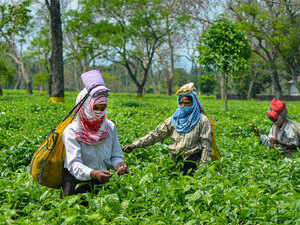 PTI
PTIProduction in the tea estates of West Bengal’s Darjeeling district has long been plagued by absenteeism, political instability in the region, and poor management. The Covid-19 pandemic has deepened the woes, forcing some promoters to look for new owners. But a drop in production and earnings means not many have the financial strength to buy.
Industry executives said 12-15 of the 87 tea estates in the region are up for sale.
The industry had lost many importers of Darjeeling tea from Japan after the violent protests and long strikes in 2017 that followed the Gorkha Janmukti Morcha’s demand for a separate state. The agitation paralysed the operations in the hills for months and the supply side for exports dried up.
“Nearly 12-15 gardens in the hills are up for sale now. But there are no takers. Very few planters have that financial power to buy Darjeeling tea estates in the current scenario,” SS Bagaria, a Darjeeling tea planter and former chairman of Darjeeling Tea Association (DTA), told ET.
There is a big dip in demand for Darjeeling tea, said Kaushik Basu, secretary of DTA. “The main sales of Darjeeling tea happen through boutique tea shops, tea lounges, restaurants, hotels. Due to the pandemic, this sales has been affected badly,” said Basu.
The closure of the tea gardens in 2017 caused a drop in production of Darjeeling tea in 2018 and 2019, as the tea bushes had gone without pruning and cutting for nearly four months. In 2020, there was a lockdown for nearly two months, which further impacted production, resulting in a drop in production from 8.5 million kg in 2016 to 6.5-7 million kg in 2020.
At the same time, the cost of production went up. “Importers reduced their offtake because they were sceptical about the supply side post 2017 agitation. Due to the pandemic, they are not ready to pay higher prices,” Basu said. “On the contrary, they are trying to negotiate on the price and bring it down. This is why many planters are not ready to run the show any more.”
This year, Darjeeling tea production is unlikely to cross last year’s level, as a dry spell during first flush has hit production. Also, monsoon rains have picked up and the production now will not fetch good prices in the market.
Basu alleged that despite making repeated presentations to the Union finance ministry, they did not get any relief from the government. “Subsidies have stopped and even the arrears are not being cleared,” he said.
Read More News on
Download The Economic Times News App to get Daily Market Updates & Live Business News.
Read More News on
Download The Economic Times News App to get Daily Market Updates & Live Business News.









 Get Unlimited Access to The Economic Times
Get Unlimited Access to The Economic Times
